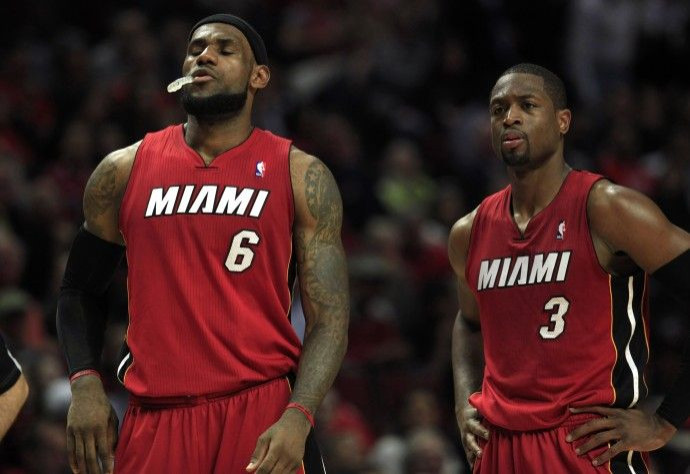Miami Heat: Why the Big 3 Can't Win the NBA Finals

On July 8, 2010, the NBA entered a new era.
LeBron James announced that he would be teaming up with Dwyane Wade and Chris Bosh to play for the Miami Heat. Such a move had never been done before.
Three stars, in their prime, forming a super-team? Sure, there have been NBA teams in the past with multiple All-Stars, but they were never formed by free agents deciding to play for one team.
The Decision started a domino effect. The idea of free agents, or free-agents-to-be, teaming up became an everyday story.
Carmelo Anthony forced a trade to the Knicks so he could play with Amare Stoudemire. Chris Paul forced his way out of New Orleans to join forces with Blake Griffin. Dwight Howard tried to force his way out of Orlando to play with a superstar, but the Magic have refused to meet his demands.
The idea that a team needs to have multiple All-Stars in order to win a championship eventually became accepted as fact. The Heat were set to dominate the NBA for years to come, with teams like the Knicks being their only competition.
But two years after LeBron James pledged to win several rings in Miami, the Big 3 is on the verge of being knocked out in the second round of the playoffs. Is this new model of building an NBA team the wrong way to build a title contender?
The 2011 NBA Finals was not only a contest between the Heat and the Mavericks; it was a battle of two different philosophies on how to build a basketball team.
Miami signed three stars, and surrounded them with marginally talented players. Dallas had one star in Dirk Nowitzki, and surrounded him with several above average players. The latter model won out, at least this time, as the Mavericks took the series in six games.
Still, the prevailing thought was that the Heat would eventually find a way to put it all together. For the entire regular season, the online gambling website sportsbook.ag gave the Heat the best odds of winning the NBA Finals, even though they finished the year with the fourth best record.
How could a team with perhaps the two best players in the league not win multiple championships? With the way the NBA is currently structured, it might be a lot harder than people initially thought.
The collective bargaining agreement between the owners and the players association doesn't allow a team to surround stars with a lot of other good players. The best players make a lot of money, leaving very little room to make moves under the salary cap.
That's why teams like the Mavericks of last year are able to be successful. Dallas had a number of good players last season, with five guys averaging at least 10 points per game.
San Antonio this season is very similar to the 2011 Dallas team. The Spurs had 10 players to average at least nine points per game in the regular season. They led the league in wins, and are the favorites to win the title.
Tony Parker was the only member of the Spurs elected to the All-Star team.
The Pacers currently lead the Heat 2-1 in their playoff series. Indiana also only has one All-Star in center Roy Hibbert. Indiana doesn't have any superstars, with no players averaging more than 18 points per game or receiving an MVP vote.
If Indiana is able to upset Miami, teams may start looking at the Heat as an example of how not to create a team.
When a team signs two max contract players, it doesn't give them any flexibility to make other moves. Because the NBA rewards the best players, but doesn't allow teams to sign free agents if it puts them over the salary cap, superstars can really hurt a team's ability to add complimentary pieces.
One player can affect a basketball game more than in any other sport. That fact has led to the notion that good ancillary pieces aren't very important. The Heat's recent struggles are showing that may not be the case.
When one superstar has a bad game, like Dwyane Wade did on Thursday night, it places the burden of leading the whole team to victory on one player's shoulders.
That's not a formula for success.
If the Heat don't even reach the finals this year, there could be a major shift in how teams are formed. Executives will start to look at the Spurs and Pacers as examples of the right way to build for the future.
Even a team like the Thunder, with two superstars in Kevin Durant and Russell Westbrook, are more like the Pacers than the Heat. Oklahoma City's key players were acquired through the draft, which has allowed them to make other moves.
It's almost unheard for a team to win a championship without a superstar. The 2004 Pistons are the only example of a title winner that didn't have a great player.
However, the Heat may be finding out that having too many stars may not be the best strategy.
© Copyright IBTimes 2025. All rights reserved.






















